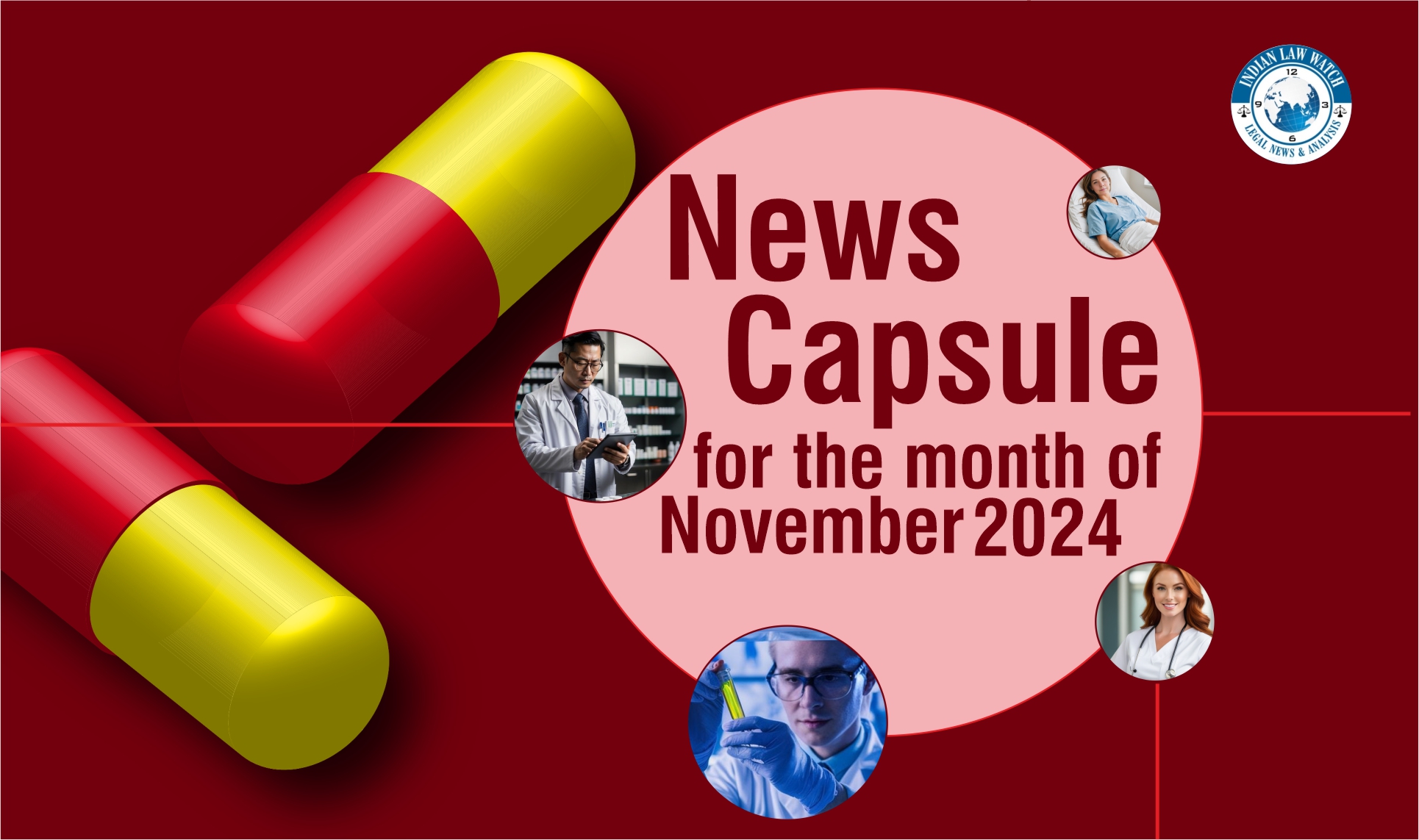
The news capsule for the month of November captures news from the healthcare and pharma sector.
1. MDR to undergo detail timelines related to medical devices manufacturing license
The Indian government plans to amend the Medical Device Rules (MDR), 2017, to include specific timelines and Quality Management System (QMS) requirements for medical device manufacturers. This initiative aims to streamline processes and enhance compliance standards for licensing and manufacturing in the sector.
Key Proposed Changes:
Timeline Definitions: The amendment will clearly outline timelines for applications and approvals related to manufacturing licenses, improving transparency and predictability for manufacturers.
Quality Management System (QMS) Requirements: The amendment will mandate adherence to QMS for Class A (non-sterile and non-measuring) medical devices, such as scalpels and gauze.
Manufacturers must ensure compliance with the Fifth Schedule of MDR, 2017, emphasizing safety and performance standards.
Registration Exemptions for Class A Devices: While such devices are exempt from licensing, manufacturers and importers must obtain registration by submitting required details under the relevant sub-rules.
This effort aligns with global trends in medical device regulation, aiming to enhance traceability, ensure product safety, and support India’s growing medical device sector. For further details, you can refer to industry analyses by Pharmabiz and regulatory insights from Compliance & Risks.

2. Retail chemists’ association and Swiggy-Pharmeasy to deliver medicines – a pilot project raise concerns
The collaboration between Swiggy and PharmEasy for a pilot project aimed at delivering medicines has raised concerns among retail chemist associations. These associations have flagged issues related to regulatory compliance, ethical practices, and potential impacts on the traditional pharmacy sector.
Key Points of Concern:
Regulatory Compliance: The associations argue that online platforms may bypass legal mandates, such as verifying prescriptions thoroughly before dispensing medicines.
Impact on Local Pharmacies: Retail chemists fear that such initiatives could disrupt their livelihoods, given the competitive pricing and convenience offered by large platforms.
Patient Safety: The potential for misuse of medicines or lack of proper guidance for consumers raises safety concerns.
Equitable Business Practices: Retail chemists emphasize the need for a level playing field and adherence to existing laws that apply to brick-and-mortar pharmacies.
The debate highlights the need for a balanced approach, ensuring innovation in healthcare delivery while protecting the interests of small businesses and maintaining public health standards.

3. New principles for the ethical collection and sharing of human genomic data by WHO
The World Health Organization (WHO) recently introduced new principles for the ethical collection and sharing of human genomic data. These guidelines aim to ensure responsible use of genomic information while prioritizing equity, transparency, and respect for individuals’ rights. Key highlights include:
- Informed Consent: Emphasizing dynamic consent models to keep participants informed throughout the data lifecycle.
- Privacy and Security: Strengthening data protection mechanisms to safeguard individuals’ genomic information.
- Equity and Access: Encouraging equitable participation in genomic research and ensuring fair access to its benefits, especially for low- and middle-income countries.
- Data Sharing: Promoting standardized and transparent methods for sharing genomic data to support global health research while respecting cultural and local contexts.
- Ethical Oversight: Establishing robust governance frameworks to address ethical, legal, and social issues tied to genomics research and applications.
These principles are part of WHO’s broader effort to democratize access to genomic technologies and foster global health equity, particularly as genomics becomes increasingly pivotal in precision medicine and disease prevention

World Health Organization (WHO)
4. Jan Aushadhi’ centres at railway stations bringing relief to people
The Jan Aushadhi Kendras (or Centres) at railway stations in Bihar are part of the Pradhan Mantri Bhartiya Janaushadhi Pariyojana (PMBJP) initiative. These centres aim to provide affordable, high-quality generic medicines to the public. Situated at key locations like railway stations, they enhance accessibility for travelers and local residents.
The centres offer medicines at prices significantly lower than branded equivalents, making healthcare more affordable. By establishing these outlets at railway stations, the government seeks to reach a larger population, especially in transit areas where immediate medical needs might arise. This initiative reflects a step towards improving public health and ensuring equitable healthcare access across the state.

5. (FDA) introduces new rules for television and radio drug advertisements
The U.S. Food and Drug Administration (FDA) has introduced new rules for television and radio drug advertisements aimed at making information clearer and less distracting for consumers. These rules require drug companies to use simpler, more consumer-friendly language, avoiding technical jargon. Advertisements must present risk information in a clear, conspicuous, and neutral manner, free from distracting visuals or audio effects, such as animations or unrelated imagery, that could reduce viewers’ focus on safety details.
This initiative builds on past research showing how visuals and audio in ads sometimes overshadow important risk information. For example, ads for some medications have used positive imagery, such as people enjoying outdoor activities, even while listing serious side effects. The FDA hopes these changes will improve viewers’ understanding and recall of both the benefits and risks of advertised drugs.
Despite the new regulations, the overall tone of ads is not expected to change significantly, as companies tend to emphasize optimistic imagery to attract attention. The rules also highlight a growing shift in pharmaceutical marketing, with companies increasingly using social media and “patient influencers,” which raises new challenges for regulatory oversight

6. Mankind Pharma to acquire Bharat Serums – CCI approves
The Competition Commission of India (CCI) has approved Mankind Pharma’s acquisition of Bharat Serums and Vaccines Limited (BSV) for approximately ₹13,630 crore ($1.6 billion). Bharat Serums, a biopharmaceutical company, specializes in women’s healthcare, assisted reproductive treatments, and critical care products. The acquisition is expected to enhance Mankind Pharma’s position in these segments while leveraging Bharat Serums’ global reach across 70 countries and advanced R&D capabilities in locations such as India, Germany, and Ukraine
This strategic move aligns with Mankind Pharma’s goals to expand its product portfolio in specialized healthcare and increase market leadership in emerging markets. The acquisition is anticipated to drive synergies between the two companies, bolstering their operational efficiency and market presence

Business Finance India News 2024
Business Finance India News 2024
7. WHO emphasizes on the importance of safe, climate-resilient, and environmentally sustainable healthcare facilities
The World Health Organization (WHO) emphasizes the importance of safe, climate-resilient, and environmentally sustainable healthcare facilities as part of its response to the growing impacts of climate change on global health. These facilities aim to ensure high-quality, accessible healthcare while minimizing their environmental footprint and preparing for climate-related challenges such as extreme weather events.
Key aspects of WHO’s guidance include:
- Health Workforce Training: Building the capacity of healthcare workers to address climate risks, respond to disasters, and reduce the disease burden caused by climate-related hazards.
- Sustainable Infrastructure: Promoting renewable energy use, efficient water and waste management, and resilient infrastructure to enhance operational sustainability and reduce costs.
- Disaster Preparedness: Implementing early warning systems, evacuation plans, and response measures for extreme weather events like floods, heatwaves, and hurricanes.
- Collaboration Across Sectors: Encouraging partnerships with sectors such as water, energy, transportation, and urban planning to integrate resilience and sustainability into healthcare systems.
These efforts not only improve healthcare delivery during crises but also contribute to long-term environmental health and universal health coverage goals

World Health Organization (WHO)
WHO
World Health Organization (WHO)





